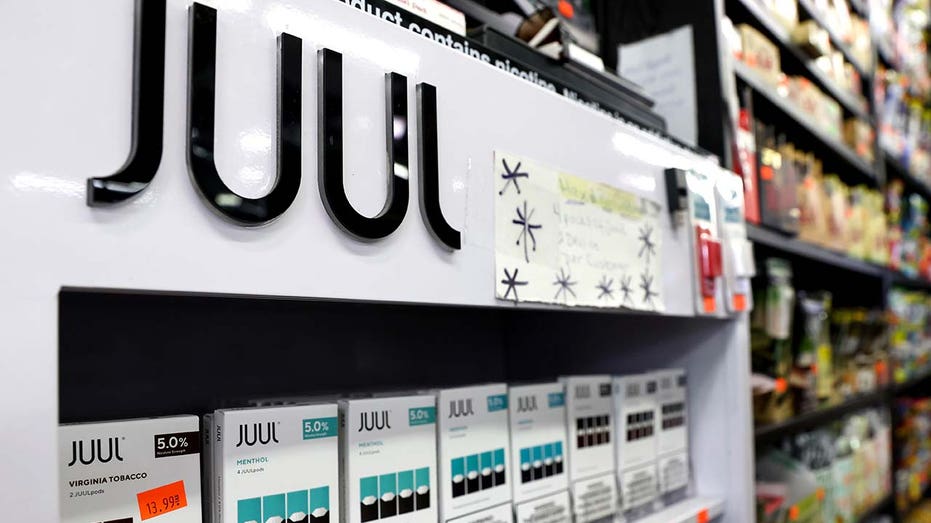Everything you need to know about the FDA's Juul ban
The agency's ban will immediately come into effect
FDA bans Juul e-cigarette products
Cato Institute Senior Fellow Jeffrey Singer joins 'Kennedy' to discuss the FDA ordering the electronic cigarette company Juul to pull its product from the U.S. market.
The Food and Drug Administration on Thursday banned e-cigarette maker Juul from selling and distributing all products in the United States.
The decision comes after a two-year review of Juul's application to keep selling menthol-flavored cigarettes, vape pens, and tobacco. The ban directly applies to Juul vaping pods and its popular vape devices.
"Today’s action is further progress on the FDA’s commitment to ensuring that all e-cigarette and electronic nicotine-delivery system products currently being marketed to consumers meet our public health standards," FDA Commissioner Robert Califf said in a statement released on Thursday. "The agency has dedicated significant resources to review products from the companies that account for most of the U.S. market. We recognize these make up a significant part of the available products and many have played a disproportionate role in the rise in youth vaping."
FDA BANS JUUL E-CIGARETTE PRODUCTS
Amid the "youth vaping epidemic" in 2019, Juul was criticized for its addictive flavored vaping products. The company was accused of marketing to young teens with fruity and mint flavors. As a result, Juul eliminated many of those flavors but still remains a popular product with millions of US teens.
Doctors and health officials are still examining the health risks posed by e-cigarettes, especially for young people.
Why are Juul products being banned?
FDA regulators found that the company's data regarding the toxicity of its products, such as nicotine pods, was insufficient. Therefore, the agency claims it was not able to fully evaluate all t potential risks of vapes and vape pods.

The health concerns over e-cigarettes started in 2019 over its growing popularity with young teens. (REUTERS/Elijah Nouvelage/File Photo / Reuters Photos)
The FDA stated Juul's application lacked "sufficient evidence regarding the toxicological profile of the products to demonstrate that marketing of the products would be appropriate for the protection of the public health. In particular, some of the company’s study findings raised concerns due to insufficient and conflicting data – including regarding genotoxicity and potentially harmful chemicals leaching from the company’s proprietary e-liquid pods – that have not been adequately addressed and precluded the FDA from completing a full toxicological risk assessment of the products named in the company’s applications."
The agency also noticed there was no conclusive way of knowing if vape juice from a third party could be harmful to users that use it in Juul pods.
Who owns Juul?
Juul is owned by Altria, a tobacco producer, and manufacturer, that bought 35% of the company for $12.8 billion in 2018. The buy-out was soon overshadowed by the FDA's investigation into the company over the health risks of vaping.
TWO ARMY SOLDIERS BEING TREATED FOR VAPING-RELATED ILLNESSES
Altria stock has tumbled 8% on Wednesday amid rumors of the ban. The company also owns many popular cigarette tobacco brands such as Marlboro, Virginia Slims, and Parliament cigarettes.
When does Juul ban take effect?
The FDA's decision is effective immediately meaning it will be difficult to secure Juul's e-cigarette products in the near future. The company is seeking legal appeals through the courts and plans to appeal the decision directly with the agency.

The Food and Drug Administration's ban on Juul products will come into immediate effect, making it difficult to secure their products in the US. (Photo by Mario Tama/Getty Images / Getty Images)
On Friday Juul asked a federal appeals court to temporarily block the FDA's decision.
"We respectfully disagree with the FDA’s findings and decision and continue to believe we have provided sufficient information and data based on high-quality research to address all issues raised by the agency," the company told Fox News Digital on Thursday.
What about their competitors?
Most of Juul's operations take place within the United States, so the immediate ban is not a good sign for their market valuation. Moreover, the company's competitors, Reynolds American, and NJOY Holdings have already received authorization from the FDA to continue selling their e-cigarette products.




















